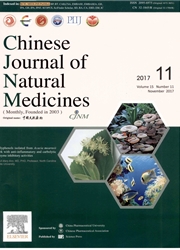

 中文摘要:
中文摘要:
目的:甘遂在我国有着几千年的应用历史,主要用于促进肠运动。通过实验观察甘遂通便促进肠推进同时是否伴有病理变化。方法:应用30%甘遂提取物给小鼠灌胃后排便及其大小肠的影响,进行组织学检查。同时观察大小肠IL-1β,TNFα和Caspase3的mRNA和蛋白表达的变化。结果:甘遂能够明显促进小鼠排稀便,抑制肠平滑肌收缩,肠粘膜出现明显炎性损伤,并伴有IL-1β和TNFα表达的上调。结论:甘遂促进排便与刺激肠粘膜分泌和炎性反应有关。
 英文摘要:
英文摘要:
AIM: Euphorbia kansui (E. KS) is a traditional medicine used in China for thousands of years with the effect of pro- pulsion in the gastrointestines. However, there is no reported study of E. KS on gastrointestinal motility until now. The aim of this work is to study the effect of E. KS on the propulsion of gastrointestines, and to elucidate the possible mechanism of action. METHODS: E.KS was prepared as a 30% ethanol extract and used for the experiment of small and large intestines of mice by oral administration with three different dosages (1.2, 0.6 and 0.3 g.kg-1). The feces were observed in vivo. The morphology was carried out to detect if there are any changes in the intestines after the extract of E. KS administration. The assays of mRNA and protein expression were employed to observe IL-lfl, TNFa and caspase 3. RESULTS: It was shown that the extract of E.KS promoted diarrhea in mouse feces after administration, inhibited the contraction of smooth muscle of mouse small intestine and caused the inflammatory exudation on the mucosa of the intestines, enhanced the expression of both mRNA and the protein levels of IL-1β and TNFa in the small or large intes- tines. CONCLUSION: The results showed that the extract of E. KS acted on the intestinal smooth muscle with propulsion of feces involving the irritation of the intestines with acute inflammatory reactions.
 同期刊论文项目
同期刊论文项目
 同项目期刊论文
同项目期刊论文
 期刊信息
期刊信息
